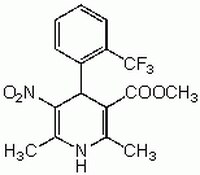196878 Sigma-Aldrich(±)-Bay K 8644 - CAS 93468-89-4 - Calbiochem
Synthetic dihydropyridine derivative that acts as an active Ca2+ slow channel agonist in neuroendocrine, muscle, thyroid and other cell types.
More>> Synthetic dihydropyridine derivative that acts as an active Ca2+ slow channel agonist in neuroendocrine, muscle, thyroid and other cell types. Less<<Sinónimos: 1,4-Dihydro-2,6-dimethyl-5-nitro-4-[2ʹ-(trifluoromethyl)phenyl]-3-pyridinecarboxylic Acid Methyl Ester
Productos recomendados
Descripción
| Replacement Information |
|---|
Tabla espec. clave
| CAS # | Empirical Formula |
|---|---|
| 93468-89-4 | C₁₆H₁₅F₃N₂O₄ |
Precios y disponibilidad
| Número de referencia | Disponiblidad | Embalaje | Cant./Env. | Precio | Cantidad | |
|---|---|---|---|---|---|---|
| 196878-1MG |
|
Ampolla de plást. | 1 mg |
|
— |
| Product Information | |
|---|---|
| CAS number | 93468-89-4 |
| ATP Competitive | N |
| Form | Yellow solid |
| Hill Formula | C₁₆H₁₅F₃N₂O₄ |
| Chemical formula | C₁₆H₁₅F₃N₂O₄ |
| Reversible | N |
| Structure formula Image | |
| Quality Level | MQ100 |
| Applications |
|---|
| Biological Information | |
|---|---|
| Primary Target | L-type Ca2+ channel |
| Purity | ≥98% by HPLC |
| Physicochemical Information | |
|---|---|
| Cell permeable | N |
| Dimensions |
|---|
| Materials Information |
|---|
| Toxicological Information |
|---|
| Safety Information according to GHS |
|---|
| Product Usage Statements |
|---|
| Packaging Information |
|---|
| Transport Information |
|---|
| Supplemental Information |
|---|
| Specifications |
|---|
| Global Trade Item Number | |
|---|---|
| Número de referencia | GTIN |
| 196878-1MG | 04055977206609 |
Documentation
(±)-Bay K 8644 - CAS 93468-89-4 - Calbiochem Ficha datos de seguridad (MSDS)
| Título |
|---|
(±)-Bay K 8644 - CAS 93468-89-4 - Calbiochem Certificados de análisis
| Cargo | Número de lote |
|---|---|
| 196878 |
Referencias bibliográficas
| Visión general referencias |
|---|
| Wang, W., et al. 2009. Proc. Natl. Acad. Sci. USA 106, 1427. Weigl, L.G., et al. 2000. J. Physiol. 525 (pt. 2), 461. Vannier, C., et al. 1995. Am. J. Physiol. 268, L201. Bechem, M., and Hoffmann, H. 1993. Pflugers Arch. 424, 343. Triggle, D.J., and Rompe, D. 1989. Trends Pharmacol. Sci. 10, 507. Takasu, N., et al. 1987. Biochem. Biophys. Res. Commun. 143, 1107. Tagliatela, M., et al. 1986. Brain Res. 381, 356. Franckowiak, G., et al. 1985. Eur. J. Pharmacol. 114, 223. |







